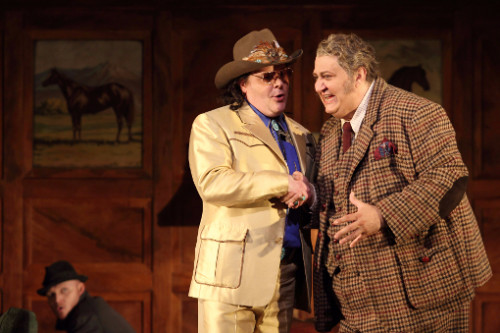 United Kingdom Verdi. Falstaff: Soloists, Chorus and Orchestra of the Royal Opera House, Covent Garden/Michael Schønwandt.(conductor) Royal Opera House, London, 15.7.2015. (CC)
United Kingdom Verdi. Falstaff: Soloists, Chorus and Orchestra of the Royal Opera House, Covent Garden/Michael Schønwandt.(conductor) Royal Opera House, London, 15.7.2015. (CC)

Cast:
Sir John Falstaff: Ambrogio Maestri
Dr Caius: Peter Hoare
Bardolph: Alasdair Elliott
Pistol : Lukas Jakobski
Meg Page: Kai Rüütel
Alice Ford: Ainhoa Arteta
Mistress Quickly: Agnes Zwierko
Nannetta:Anna Devin
Fenton: Luis Gomez
Ford: Roland Wood
Windsor, the 1950s. This is where Robert Carlsen sets Verdi’s enduring late masterpiece, Falstaff. My colleague Jim Pritchard reviewed the 2012 showing of this production here and I share his doubts as to the wisdom of moving the action to this period. Nothing much is gained, except for a shedload of brown. That’s not a euphemism – the onstage horse was, as far as I could tell, well behaved – but there is rather too much brown panelling around, suggesting a gentlemen’s club from which women are most resolutely barred (the panelling in fact seemed to reappear as part of the Jette Parker Young Artists Summer Performance a few days later, which shows commendable thrift on Covent Garden’s part). The overall problem seems to be that Verdi’s genius score blazes with bright light, its genius concealed behind a comedic sense that is intrinsically human and joyous.
To blunt this score’s light (literally, in colour terms) is to harm the work itself. Perhaps the orchestra could have compensated by giving us its not inconsiderable best, but to do so it needs someone who can inspire it. Alas, Michael Schønwandt was not quite that person. Verdi’s glorious, riotous opening with its punctuating accents was merely nicely together, not grab you by the throat involving. In fairness, Schønwandt’s strength was that he could produce deft, light playing from his forces, and he could also command instant, chameleon-like responses, and in Falstaff that’s important. But not everything; a sense of the larger scale of this masterpiece was missing. It is very late Verdi, remember, and as such everything has its place, everything is finely tuned and judged.
It was left to the Falstaff of the moment, Ambrogio Maestri (the only big name in the cast) to attempt to rescue the evening. This magnificent mountain of a human seems to have the ability to make every performance fresh, as if it is the first in a run – at least, that was the impression here. With very few exceptions (the very occasional studied gesture), no-one, surely, could guess that Maestri has sung the role over 250 times all over the World, and he came very close to being Verdi’s Saviour. Maestri has huge stage presence (huge in all senses), and the title role is clearly fully under his skin. Joined in the first scene by Dr Caius (the experienced Peter Hoare), and Alasdair Elliott and Lukas Jakobski making up the comedic pair of Bardoph and Pistol, Maestri nevertheless took full command. The cast that featured a number of Royal Opera role debuts: Ainhoa Arteta (Alice), Roland Wood (Ford), Anna Devin (Nannetta), Luis Gomes (Fenton), Agnes Zwierko (Mistress Quickly) and Peter Hoare (Dr Caius) all took their roles for the first time here. But it was Maestri that overshadowed all, perhaps at his finest in the opening stages of the third act, his characterful singing surely verging on the great. Special mention should perhaps go to Luis Gomes’ excellent Fenton. Gomes is a member of the Jette Parker Scheme, and a real credit to it. Baritone Roland Wood was the Ford, giving it all the heft his voice could muster.
So to the ladies – or, in the second scene of the first act, the ladies who lunch, caught in Ford’s spotless kitchen that would be any fifties housewife’s dream. Brigitte Reiffenstuel’s costumes placed the ladies perfectly. Ainhoa Arteta, a name new to me, shone as Alice; perhaps Kai Rüütel’s Meg was less immediately pleasing vocally. Anna Devin made for a delightful, fresh-voiced Nannetta, consoling herself in the second act with copious scoops of ice cream and later making for a memorable Queen of the Fairies. As Mistress Quickly, Agnes Zwierko was a magnificent Shakesperian Hyacinth Bucket, her voice suggesting just the right amount of parody.
The final act was perhaps the strongest in terms of staging. The magical element was portrayed as decidedly Pagan in Carlsen’s staging, with the preponderance of stag’s horns for the chorus, lending it real dramatic power, and it was here that a sense of ensemble was at its most audible. But the final fugue was perhaps not the climactic act of genius that it really, really is in a great performance. Nevertheless, there was plenty to enjoy along the way.
Colin Clarke
